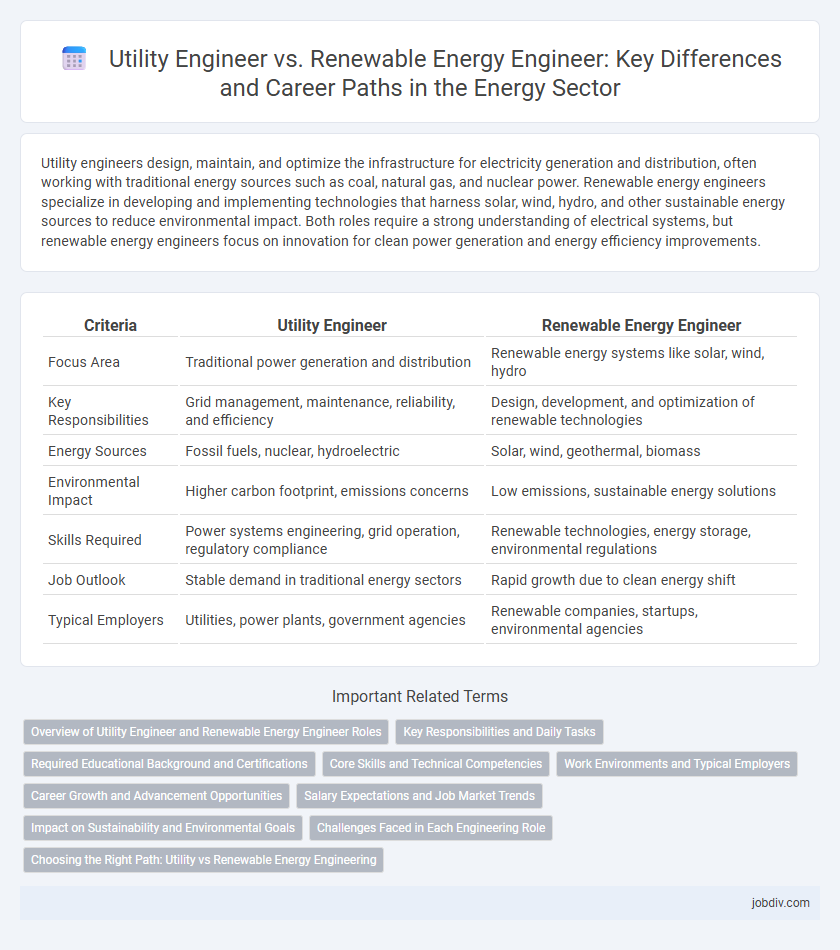Utility engineers design, maintain, and optimize the infrastructure for electricity generation and distribution, often working with traditional energy sources such as coal, natural gas, and nuclear power. Renewable energy engineers specialize in developing and implementing technologies that harness solar, wind, hydro, and other sustainable energy sources to reduce environmental impact. Both roles require a strong understanding of electrical systems, but renewable energy engineers focus on innovation for clean power generation and energy efficiency improvements.
Table of Comparison
| Criteria | Utility Engineer | Renewable Energy Engineer |
|---|---|---|
| Focus Area | Traditional power generation and distribution | Renewable energy systems like solar, wind, hydro |
| Key Responsibilities | Grid management, maintenance, reliability, and efficiency | Design, development, and optimization of renewable technologies |
| Energy Sources | Fossil fuels, nuclear, hydroelectric | Solar, wind, geothermal, biomass |
| Environmental Impact | Higher carbon footprint, emissions concerns | Low emissions, sustainable energy solutions |
| Skills Required | Power systems engineering, grid operation, regulatory compliance | Renewable technologies, energy storage, environmental regulations |
| Job Outlook | Stable demand in traditional energy sectors | Rapid growth due to clean energy shift |
| Typical Employers | Utilities, power plants, government agencies | Renewable companies, startups, environmental agencies |
Overview of Utility Engineer and Renewable Energy Engineer Roles
Utility Engineers primarily focus on the design, operation, and maintenance of large-scale energy systems, including electrical grids, power plants, and transmission infrastructure. Renewable Energy Engineers specialize in developing and implementing technologies like solar, wind, and hydroelectric power to create sustainable energy solutions. Both roles require expertise in energy systems but differ in their core objectives, with utility engineers emphasizing reliability and infrastructure, while renewable engineers prioritize sustainability and innovation.
Key Responsibilities and Daily Tasks
Utility Engineers manage and maintain large-scale electrical grids, focusing on system reliability, load balancing, and infrastructure upgrades to ensure consistent power delivery. Renewable Energy Engineers design, implement, and optimize sustainable energy systems such as solar, wind, and hydroelectric projects, emphasizing efficiency and environmental impact reduction. Both roles require analyzing data and coordinating with technical teams, but Utility Engineers prioritize grid stability while Renewable Energy Engineers concentrate on integrating green technologies.
Required Educational Background and Certifications
Utility Engineers typically require a bachelor's degree in electrical, mechanical, or civil engineering, with certifications such as the Professional Engineer (PE) license enhancing career prospects. Renewable Energy Engineers often hold degrees in renewable energy, environmental engineering, or related fields, with specialized certifications like the NABCEP (North American Board of Certified Energy Practitioners) for solar energy or the Certified Energy Manager (CEM) credential. Both roles demand strong technical knowledge, but Renewable Energy Engineers focus more on sustainable technologies and may benefit from training in energy policy and environmental regulations.
Core Skills and Technical Competencies
Utility Engineers specialize in power distribution, grid management, and infrastructure maintenance, with expertise in electrical systems, SCADA technology, and regulatory compliance. Renewable Energy Engineers focus on designing, developing, and optimizing solar, wind, and bioenergy systems, possessing skills in energy modeling, sustainable technologies, and performance analysis. Both roles require strong problem-solving abilities, proficiency in CAD software, and knowledge of industry standards like IEEE and IEC, but Renewable Energy Engineers emphasize innovation in clean energy solutions while Utility Engineers concentrate on reliability and grid stability.
Work Environments and Typical Employers
Utility Engineers commonly work in traditional energy sectors such as power generation plants, electrical grids, and utility companies, focusing on maintaining and optimizing large-scale energy infrastructure. Renewable Energy Engineers are typically employed by solar, wind, and other clean energy firms, government research agencies, and environmental organizations, concentrating on designing and implementing sustainable energy solutions. Work environments for Utility Engineers often involve on-site plant monitoring and grid management, whereas Renewable Energy Engineers frequently engage in fieldwork, project development, and innovation in emerging technologies.
Career Growth and Advancement Opportunities
Utility engineers often advance through roles in infrastructure management and grid optimization, gaining expertise in large-scale energy distribution systems. Renewable energy engineers experience rapid career growth fueled by expanding clean energy markets, with opportunities in solar, wind, and battery technology development. Specializing in either field offers distinct pathways, with renewable sectors showing higher growth rates aligned with global sustainability goals.
Salary Expectations and Job Market Trends
Utility engineers typically earn between $70,000 and $100,000 annually, reflecting steady demand in traditional energy sectors such as power distribution and grid maintenance. Renewable energy engineers command higher salaries, ranging from $80,000 to $120,000, driven by the expanding global investment in solar, wind, and green technologies. Job market trends indicate rapid growth and greater future opportunities in renewable energy engineering, fueled by government incentives and corporate sustainability goals.
Impact on Sustainability and Environmental Goals
Utility Engineers manage large-scale energy infrastructure ensuring reliable electricity delivery with incremental improvements in efficiency and emissions reduction. Renewable Energy Engineers design and implement sustainable energy systems like solar, wind, and hydro, directly advancing environmental goals by significantly lowering carbon footprints. Their work accelerates the transition to clean energy, supporting global sustainability commitments and reducing dependency on fossil fuels.
Challenges Faced in Each Engineering Role
Utility engineers face challenges related to maintaining and upgrading aging infrastructure while ensuring grid reliability and compliance with regulatory standards. Renewable energy engineers encounter difficulties in optimizing the integration of variable energy sources like solar and wind into the grid, managing storage solutions, and reducing costs. Both roles require addressing the complexity of balancing energy demand, system efficiency, and environmental impact within evolving technological frameworks.
Choosing the Right Path: Utility vs Renewable Energy Engineering
Utility Engineers specialize in power generation, transmission, and infrastructure maintenance within traditional energy systems, ensuring grid reliability and efficiency. Renewable Energy Engineers focus on designing and implementing sustainable technologies such as solar, wind, and bioenergy systems to reduce carbon footprints and promote clean energy adoption. Selecting the right path depends on career goals related to legacy energy stability or advancing innovative, eco-friendly energy solutions.
Utility Engineer vs Renewable Energy Engineer Infographic

 jobdiv.com
jobdiv.com